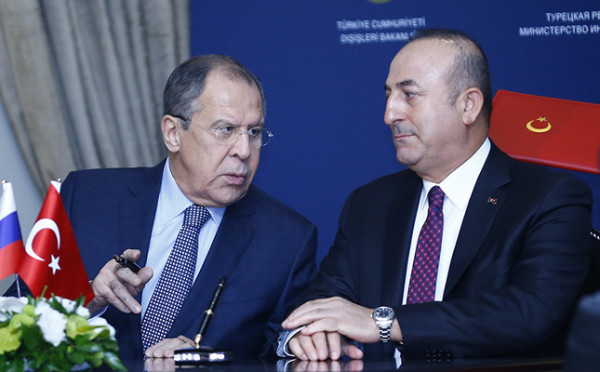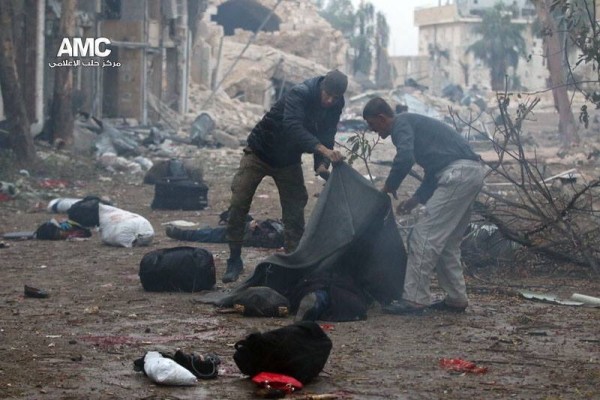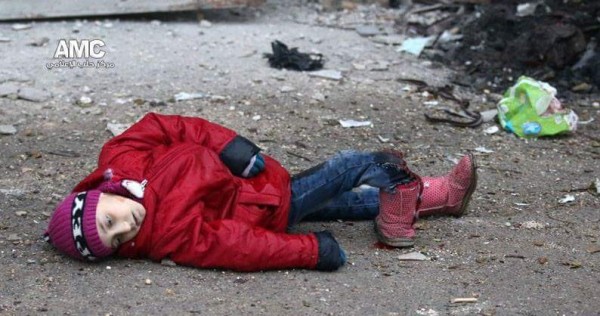LATEST
THURSDAY FEATURE
Opinion: The Failure Over Aleppo
UPDATE 1230 GMT: The Russian and Turkish Foreign Ministers said on Thursday that they agreed on the need for a halt to fighting and the provision of aid in Aleppo, although deep divisions remain between them over the conflict.
Turkish Foreign Minister Mevlüt Çavuşoğlu and Russian counterpart Sergey Lavrov held a joint news conference in the TUrkish town of Alanya on the Mediterranean.
“A ceasefire must be achieved in all of Syria, notably in Aleppo,” Çavusoğlu said, adding Ankara was in agreement with Russia in broad terms on the need for a truce, humanitarian aid, and political transition.
Lavrov said that the bloodshed must stop in Syria and the region, that Moscow was ready to talk to all parties in the war, and that it would continue cooperating with Turkey.
However, Lavrov also vowed that Russia would continue its operations in eastern Aleppo and would rescue the city from what he described as “terrorists”. He did not explain how this position was compatible with that for a ceasefire.

Since August, Turkish and Russian leaders have regularly discussed the situation in northern Syria. The encounters between Turkish President Recep Tayyip Erdoğan and Russia’s counterpart Vladimir Putin have fed claims that the two sides have struck a deal — Russia and the Assad regime can overrun eastern Aleppo city while Turkey, which launched its own military intervention on August 24, can help rebels take much of northern Aleppo Province.
Erdoğan and Putin talked for the third time in a week on Wednesday. They agreed on the need for a ceasefire, sources in Erdogan’s office said.
ORIGINAL ENTRY: Regime shelling killed 45 fleeing civilians in eastern Aleppo on Wednesday, as pro-Assad ground forces continued their attempt to break resistance in Syria’s largest city.
The civilians, leaving areas of fighting, were cut down by shelling of the Jub al-Qubba district. Videos and pictures showed bodies in the dust-filled rubble of the street.
Russia and the Assad regime have tried to maintain the line that their assault, which has taken about 1/3 of opposition territory since last territory, has freed civilians from being held hostage by “terrorists”. About 20,000 of the estimated 270,000 people in eastern Aleppo have left for either regime-held areas or the mainly-Kurdish district of Sheikh Maqsoud, but those remaining are trying to find security amid the air and ground attacks, often sheltering in basements.
Russian and Syrian State media have not mentioned any civilians killed by the bombing and shelling.
The president of the Aleppo local council, Brita Hagi Hasan, pleaded for a safe corridor for people to leave:
The civilians are calling for the world to help. In the name of humanity let the civilians leave the city. Help the civilians! Protect the civilians!
Hasan was appearing alongside French Foreign Minister Jean-Marc Ayrault, who has led an effort for a UN Security Council resolution to halt the attacks. However, Russia has indicated that it will veto any measure.
Ayrault told the news conference:
Our priority first is to protect the civilian population and have some concrete measures in place.
We shall see what the members of the Security Council can do to save lives. Everyone is against the wall, but we can’t look the other way.
The UN’s head of humanitarian operations Stephen O’Brien told an emergency session of the Security Council on Wednesday, “For the sake of humanity, we call on, we plead, with the parties, and those with influence, to do everything in their power to protect civilians and enable access to the besieged part of eastern Aleppo before it becomes one giant graveyard.”
However, Russian Ambassador Vitaly Churkin said “counter-terrorist operations” will not be halted against “bandits” that the UK and France had “coddled and fuelled”. He added that UN resolutions calling for an end to the bloodshed are “a pointless tactic”.
Reports are continuing that hundreds of men have been seized by the pro-Assad forces, with friends and families fearing they will disappear in detention.
A regime “military source” insisted that displaced people whose identities were not known were being moved into “specific places” in safe areas of Aleppo.
Photographs brought out by a defecting military photographer established that the regime has tortured and killed thousands of detainees.
On Wednesday, pro-Assad forces tried to advance in Sheikh Saeed, on the southeastern edge of the remaining opposition territory. Regime media, citing a “military source”, said the district had been captured; however, a rebel official denied the claim.
“The regime entered Sheikh Saeed, and then the rebel factions pushed it out,” said Zakaria Malahifji of the Fastiqim group. “The factions took complete control of the district.”
Other reports said fierce fighting continued, with pro-Assad forces holding much of the neighborhood, which has been under attack by foreign forces and the Syrian army for weeks.
An image from Jub al-Qabba:

Video: Profile of Frontline Journalist Hadi al-Abdallah
The New York Times profiles the work of Hadi al-Abdallah, who has spent years reporting from rebel frontlines and opposition territory.
Abdallah was critically injured in June and his friend and cameraman Khaled al-Issa killed by an improvised explosive attack. The reporter returned to the field this autumn.
The correspondent was awarded Reporters Without Borders’ 2016 Press Freedom Award earlier this month.

